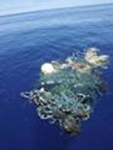Three trillion pieces of plastic are estimated to be floating in the Pacific Ocean. As it breaks down into smaller pieces fish ingest it and are killed. The plastic also interferes with the photosynthesis going on in the ocean and contributes to global warming. We may be miles from the ocean, but our trash can end up there.
Here are simple  steps to reduce the chances of your waste ending up in the ocean. After all, 80% of marine debris originates on land:
steps to reduce the chances of your waste ending up in the ocean. After all, 80% of marine debris originates on land:
- When you visit parks and beaches, keep an eye on food wrappers, plastic sacks, paper plates, drink containers, and other lightweight disposable items that can easily take to flight with even the slighest gust of wind. Make sure you either carry these items out with you, or dispose of them in trash bins. An even better idea is to pack your food and drink in reusable containers and resuable canvas bags. And make sure you retreive all toys and recreational equipment before you leave. Regardless of whether these items seem like “litter,” they’ll eventually be swept out to sea and become threats to the health of marine animals.
- Around town, you can help prevent marine debris by keeping trash out of streets, gutters, walkways, parking lots, lawns, sidewalks, and pretty much everywhere else litter might accumulate. This litter usually finds its way into a local storm drain via rain or wind and then–regardless of how close you live to the nearest ocean–it’s eventaully discharged into an ocean, bay, sea, or gulf.
- Even at home, your actions may help reduce the volume of global marine debris. For example, think twice before using toilets as garbage bins for trash and personal care products. Although sewage treatment plants are designed to filter out bulky items, it’s not uncommon for untreated sewage–especially if it’s combined with storm water–to be discharged directly into a nearby river or ocean. So remember to use the trash can instead of the toilet for things made from latex, plastic, metal, and silicone.
- Never dump kitchen grease down drains or garbage disposals. Grease is the most common cause of sewage-system blockages, which can result in overflows or spills into oceans and other waterways.
- In addition to being more conscious of your own actions, consider joining a grassroots or national campaign to beautify a local park. neighborhood, beach, or riverbank.